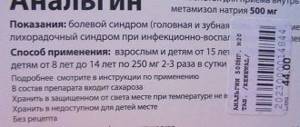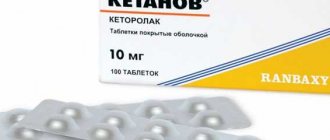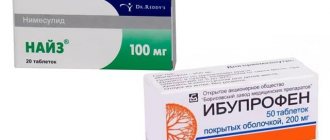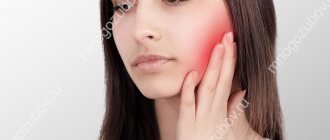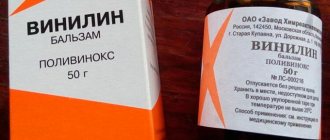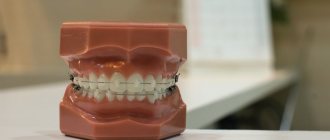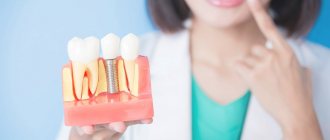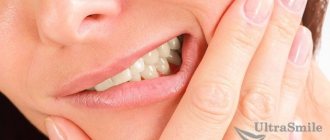Toothache is so unbearable that a person is looking for a reliable painkiller that will help temporarily numb the pain. One of these medicines for toothache is Nimesil. It relieves pain and stops inflammatory processes in soft and bone tissues. In our article we will look at how to take Nimesil for toothache, its positive and negative aspects of its effects, as well as analogues.
Effectiveness for toothache
The medicine can be used for toothache in dentistry
Toothache is not a direct indication for taking Nimesulide.
This drug is used primarily for rheumatic diseases that affect the joints and surrounding tissues.
The action of the medicine is aimed at eliminating the symptoms of inflammation, which include pain.
However, due to the specificity of its effect on pain receptors, Nimesulide is often prescribed for pain syndromes whose origin is not related to rheumatic processes.
In view of this, the medicine can be used for toothache in dentistry.
Important to remember! The effectiveness of Nimesulide depends on the reason for the toothache. In severe dental pathologies, even potent analgesics cannot eliminate the symptom.
Effective against gingivitis
Gum inflammation is one of the most common dental disorders. For therapeutic purposes, patients may be prescribed Nimesulide, but it is taken in combination with other medications.
Taking the described drug is advisable for the purpose of symptomatic therapy, as it eliminates swelling and helps normalize local temperature.
Description of the drug
Nimesil belongs to a new generation of medications and is not known to all patients. Many people prefer to use proven analgesics for years - paracetamol and analgin. How does Nimesil differ from the listed tablets? The active medicinal agent in the drug is nimesulide, which has the following characteristics:
- quickly relieves pain impulses;
- stops the inflammatory process.
This drug was intended for the treatment of inflammatory processes in the joints, and is now prescribed for osteochondrosis, arthritis and arthrosis. The advantage of the drug over other analgesics is the absence of an aggressive effect on the gastrointestinal mucosa. The medicine acts for its intended purpose without interfering with the functioning of other body systems. Nimesil only blocks the production of enzymes that organize the development of the inflammatory process in tissues.
The drug is used in the form of a powder diluted with water. the resulting suspension has a pleasant taste and aroma of exotic fruits. The drug stops pain impulses for a long time, depriving a person of sensitivity to pain. For this reason, dentists do not recommend drinking Nimesil suspension for toothache before visiting the office, since it is difficult to determine the affected area. But after dental treatment or tooth extraction, Nimesil will provide an invaluable service.
Composition and mode of action
Nimesulide is a non-steroidal anti-inflammatory drug
The drug is available in tablets and gel form. Each contains 100 mg of the active ingredient – Nimesulide.
The product is also available in powder form, with which a liquid suspension is prepared for oral administration.
The auxiliary components are cellulose, lactose monohydrate, magnesium stearate.
Nimesulide is a non-steroidal anti-inflammatory drug.
The action of the active components is aimed at slowing down the production of prostaglandins - substances that are responsible for the formation of the inflammatory response.
The drug has an effect:
- Anti-inflammatory;
- Analgesic (pain reliever);
- Antipyretic.
The effect after administration is observed quite quickly; on average, it begins to act within 25-30 minutes. The analgesic effect lasts for a fairly long period of time - up to 10 hours.
pharmachologic effect
The active ingredient Nimesil is an aniline derivative and is widely used to treat inflammatory diseases. The non-steroidal effect is to stop the synthesis of prostaglandins. As a result, already half an hour after taking a single dose of Nimesil, signs of inflammation decrease: pain, swelling.
The medicine specifically affects the accumulation of lymphatic fluid, relieving unpleasant symptoms. Most analgesics have a negative effect on the gastrointestinal tract. The drug Nimesil is designed specifically to act only on inflamed tissue. This remedy will relieve tooth pain of any etiology. But after the condition has eased, you need to visit a doctor to draw up an optimal dental treatment plan.
Uncontrolled intake of Nimesil inside will not only harm the body, but will also cause addiction, the body will develop resistance to it, and it will stop helping. In this case, next time it will be much more difficult to choose an effective anti-inflammatory and analgesic agent.
Use for toothache
Powder is poured into warm liquid
The medicine is intended for oral administration.
Any anti-inflammatory drugs are recommended to be taken after meals, which is necessary to accelerate absorption in the intestines.
The tablets are taken by swallowing the drug.
It is recommended to take the medicine with a sufficient amount of liquid. The method of using the powder is different.
Instructions for use:
- The contents of the sachet are poured into a glass;
- The powder is poured with warm liquid (about 1/3 cup);
- The mixture is thoroughly stirred;
- The resulting liquid is taken orally.
As a rule, one dose (100 mg of Nimesulide) is enough to eliminate the unpleasant symptom.
Important to remember! The drug in gel form is not used in the treatment of dental diseases or any other pathologies of internal organs or mucous membranes. The gel is prescribed exclusively for the treatment of joint pain for local application.
Dosages
For toothache, take 1 dose of the drug. If the pain syndrome resumes, re-administration is carried out no less than 6 hours later.
The maximum daily dose is 400 mg (4 tablets). Long-term treatment of toothache with Nimesulide is contraindicated due to possible side effects.
List of contraindications
It is forbidden to drink Nimesulide if you have the following contraindications:
- The drug is contraindicated for children under 12 years of age
Age limit (children under 12 years old);
- Pregnancy period (especially the 3rd trimester);
- Kidney or liver failure;
- The presence of ulcerative lesions of the stomach or intestines;
- Internal bleeding.
In such cases, taking the medicine is strictly prohibited, as it is likely to lead to severe adverse reactions.
There are also relative contraindications, in which the drug is prescribed with caution.
These include:
- Lactation period;
- Heart failure;
- Low pressure;
- Allergy;
- Individual hypersensitivity.
Admission in childhood
Nimesulide is prohibited for children under 12 years of age. This is explained by the fact that the drug is characterized by increased toxicity to the liver and kidneys. This deficiency is typical for most anti-inflammatory drugs.
The body of adults tolerates taking Nimesulide much easier, while taking it in childhood can cause severe poisoning.
Use during pregnancy and lactation
Pregnant women are prohibited from using Nimesulide. This is associated with a potential risk to the fetus. An anti-inflammatory drug can cause uterine atony.
During lactation, the medicine is used only if breastfeeding is interrupted for the period of treatment.
To eliminate toothache, you can use other painkillers, the use of which is permitted during pregnancy and during breastfeeding.
Advantages and disadvantages
Nimesulide is characterized by a large number of advantages, due to which this medicine is often prescribed to relieve toothache.
These include:
- Nimesulide is characterized by a large number of advantages, due to which this medicine is often prescribed to relieve toothache
Pronounced effect;
- Addressing the cause of pain – inflammation, rather than eliminating the symptom;
- Efficiency in a wide range of pathologies;
- Long lasting;
- Low likelihood of side effects if dosages are followed;
- Availability.
Despite the listed advantages, the medicine is also characterized by a number of disadvantages.
These include:
- Prohibited for use by pregnant women and children;
- Not intended for long-term use;
- Possibility of addiction;
- Liver toxicity;
- Potential possibility of overdose and poisoning.
Important to remember! Nimesulide is used to relieve acute toothache. Constant treatment will not eliminate the cause of this pathology, and therefore a complete cure requires the help of a dentist.
What are the causes of ear pain?
1. Inflammatory process
Pain inside the ear is most often a sign of an inflammatory process, most often otitis media. Inflammation can be localized in the area of the auricle, external auditory canal, middle ear (tympanic cavity, mastoid process, Eustachian tube).
Symptoms of otitis externa: at the beginning of the disease, pain in the ear is not severe, itching and ear congestion are possible. As the pain progresses, it intensifies and becomes unbearable; when you pull outward with your fingers, the auricle and ear become sharply painful. Further, the soft tissues of the parotid region are involved in the process, which also become sharply painful when pressed and palpated.
The cause of inflammation of the external auditory canal is most often a swollen and infected wax plug and fungi (with otomycosis), trauma (for example, when trying to remove wax on your own with a cotton swab, match, etc.), foreign bodies (cotton wool, insects, etc.)
What you should absolutely not do if you have external otitis: - warm your ears, go to the bathhouse, sauna, swimming pool; Place alcohol drops in your ear.
It is recommended that if the pain is severe, take a painkiller and consult an ENT doctor as soon as possible.
Symptoms of inflammation of the middle ear (otitis media) - acute otitis media, as a rule, occurs due to an acute respiratory infection, accompanied by a runny nose and nasal congestion.
How to determine this? The pain intensifies when pressing on the tragus (the protrusion in the auricle near the opening of the external auditory canal). In addition, with acute otitis media, the temperature rises, lumbago appears in the ear, and pus may be discharged from the ear. Often these symptoms accompany an advanced or untreated infectious disease.
What to do? Any pain in the ear requires consultation with an otolaryngologist. Therefore, if there is pain in the ear, to relieve the condition you can take a painkiller (paracetamol, analgin, nurofen, nimesil, theraflu, etc.); if you have nasal congestion, we recommend that you put vasoconstrictor drops into your nose (naphthyzin, otrivin, nazivin, etc.). etc.). And be sure to consult an ENT doctor as soon as possible.
What can't you do? Do not take antibiotics without a doctor's prescription. In addition, if the body temperature is elevated or periodically increases, the pain in the ear is throbbing, or there is purulent discharge from the ear, then it is absolutely forbidden to warm the sore ear! You should not put drops in your ears without a doctor's prescription. Wax suppositories are strictly prohibited for any otitis media.
Preventive measures. Often, otitis media appears after an advanced cold, flu or sore throat, or runny nose. The disease can recur (renew) against the background of an enlarged adenoid or chronic rhinitis, sinusitis. Therefore, such diseases must be treated based on the recommendations of your ENT doctor, and, most importantly, the treatment must be completed.
2. Caries
Oddly enough, the cause of ear pain can be dental caries. With advanced caries, throbbing or aching pain in the ear is caused by an inflammatory process of the tissues around the diseased tooth, as pain sensations are transmitted along the nerve to the ear.
How to determine this? Ear pain is throbbing or aching, often combined with toothache. It intensifies when pressing on a sore tooth, when chewing, or when eating cold and hot food. At night it hurts more than during the day.
What to do? Of course, it's faster to visit the dentist. Before seeing a doctor, you can reduce the pain by taking a pain reliever. You can rinse with soda - take a glass of warm boiled water and add 1 teaspoon of soda and 2 drops of iodine.
What can't you do? Do not apply a warm compress to the side of the diseased tooth. Do not pick the tooth with any objects or touch the inflamed tooth or gum with your hands. This may lead to the spread of infection.
Preventive measures. Avoid dental problems; any hole in a tooth can lead to infection and inflammation.
3. Trigeminal neuralgia
Trigeminal neuralgia (nerve inflammation) can also cause ear pain.
How to determine this? The pain can be shooting and short-term, or it can be mild and constant and be felt not only in the ear, but also in the parotid region, the parietotemporal region. At the same time, the patient notes that it is unpleasant for him to touch the scalp and hair on this side, hyperesthesia appears - increased sensitivity.
What to do? If you have such symptoms, you should immediately consult a neurologist. But you will most likely need a consultation with an ENT doctor to rule out ear diseases. Indeed, in the case of pathology of the ENT organs, only he will be able to prescribe the necessary treatment, specific to your case.
What not to do? You should not eat spicy foods, coffee or strong tea. They can increase pain.
Preventive measures. Do not overcool your body. Neuralgia can be caused by prolonged hypothermia, especially combined with physical activity. Old spinal injuries may also be possible causes.
4. Furuncle
If there is severe pain inside the ear and there is pus discharge, then a possible cause is a boil. This is a localized inflammation of the hair follicle.
How to determine this? The pain is constant, intense, and intensifies when pressing on the tragus of the ear.
What to do? You need to make an appointment with an ENT doctor, preferably an operating one, because... To properly open an abscess (which is an inflamed boil), surgical intervention and the prescription of effective antibacterial therapy are necessary.
What can't you do? You cannot open a boil yourself, so as not to introduce an infection into the body. In addition, remember that uncontrolled self-medication with antibiotics is not only ineffective, but can harm you in the future.
Preventive measures. Keep your ears clean. A boil appears due to the lack of simple hygiene procedures - in those who do not clean their ears or clean them with sharp objects that are dangerous for this.
5. Unfortunately, there are many other causes of ear pain - infection, injury, wax, etc.
It’s impossible to list everything in our short article. Therefore, the next question is as old as time.
Nimesulide, Nimesil, Nimulid - are there any differences?
The drug Nimesil is available exclusively in powder form
The question of whether there is a difference between the presented drugs is very relevant.
In general, these drugs are direct analogues. They have the same active ingredient - Nimesulide.
The differences lie solely in the release form and secondary components.
The drug Nimesil is available exclusively in powder form.
Nimulid can be purchased in gel form, but it is also available in syrup form. This medicine contains a low dose of Nimesulide, which is why it can be prescribed in pediatrics.
Which product should I choose?
To eliminate toothache, it is recommended to use Nimesulide tablets or Nimesil powder. They have the same concentration of the active ingredient - 100 mg.
Nimulid syrup can be given to children under 12 years of age, but in childhood many other painkillers that are safer for the child’s body can be used.
Analogs
Analogs include drugs that also have anti-inflammatory and analgesic effects:
| Name | Price | Description |
| Ketanov | From 230 rubles for 10 tablets | It is a non-steroidal anti-inflammatory drug with a pronounced analgesic effect. Effective for toothache, but the effect is short-lived - on average up to 4-5 hours. |
| Nimesil | From 35 rubles for 1 sachet | A drug based on Nimesulide. It is a powder for preparing a suspension. In a short period of time it eliminates pain and reduces body temperature. |
| Nemulex | From 190 rubles for 10 bags | Available in powder form. The main active ingredient is Nimesulide. It is used to eliminate pain, including that caused by dental disorders. |
| Nimika | From 210 rubles per pack of 20 tablets | The drug is in the form of tablets based on Nimesulide. Available in tablets of 50 mg and 100 mg. Effective for pain syndromes of inflammatory origin. |
Generics
To relieve toothache with Nimesil, just drink one sachet. In the case of selecting an analogue, the medicinal dose may differ from that of Nimesil, since the amount of the active substance in the drugs is different. Popular inexpensive remedies for tooth pain include Nise, Mesulide, Nimid.
What is the difference between Nimesil and the generic? Analogues are cheaper than the original, but may contain other preservatives and flavorings. In addition, production cycles differ. Avoid buying medicine in spontaneous places so as not to purchase a counterfeit.
Don't self-medicate! Take Nimesil strictly as prescribed before visiting a doctor and after treatment or tooth extraction.
Reviews
In this section you can read user reviews about the drug Nimesulide and its analogues, the effectiveness of the drug, side effects, and features of administration.
Nimesulide is a drug with a pronounced analgesic effect, which occurs by eliminating the inflammatory reaction. The medicine helps eliminate toothache, but has only a symptomatic effect.
To prevent the recurrence of the disease, you need to visit the dentist and eliminate the reason why it occurs.
Exceeding the dose
Treatment of overdose symptoms from Nimesil in the treatment of tooth pain is symptomatic. If they occur, you must stop using the medicine and rinse your stomach, but no later than 4 hours after taking it. To reduce the toxic effect of the substance, drink a sorbent (activated carbon, atoxyl, smecta) according to the instructions for the drug.
The interaction of certain groups of drugs with Nimesil can also cause increased side effects during treatment or a decrease in its effect. Before taking multiple medications for toothache at the same time, you should consult your doctor.

